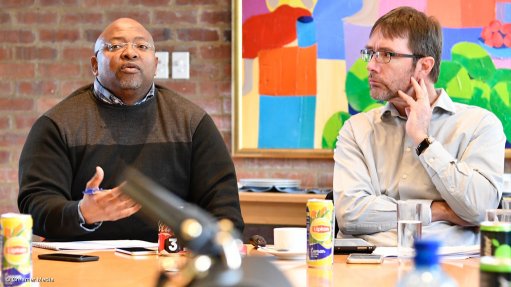
MCSA public affairs and transformation senior executive Tebello Chabana and CEO Roger Baxter
Photo by: Dylan Slater
JOHANNESBURG (miningweekly.com) – Leading up to Mineral Resources Minister Gwede Mantashe’s summit this weekend to discuss the draft Mining Charter, Minerals Council South Africa (MCSA) has noted that it is critically important that the Department of Mineral Resources (DMR) make allowances for junior miners and explorers by taking a “graduated approach to the application of the Mining Charter”.
Emerging miners, particularly at the exploration level, MCSA CEO Roger Baxter said on Friday, need to be given an exemption from the Mining Charter requirements in some instances, or have a “Charter light” version to comply with.
Smaller companies have less capability to deal with some of the imposed costs and challenges related to the implementation of the charter, MCSA public affairs and transformation senior executive Tebello Chabana added.
These include, but are not limited to, getting financing, while dealing with regulatory requirements and delays, as well as licensing.
Providing these miners with a lighter version of Mining Charter requirements to adhere to, or a full exemption, will allow these companies to grow, he said. “As you go along, you graduate the process towards full compliance of the Mining Charter”.
The MCSA, meanwhile, reiterated its firm support for the proposed 30% black ownership requirement for new mining rights.
It does, however, not support the suggested 10% free-carried interest (FCI) for mining communities and employees. “The 10% FCI will materially undermine new investment by pushing up investment hurdle rates and ensuring that many new projects become unviable”.
The FCI, MCSA explained, at no cost and no participation at the capital raising process by its recipients, increases the cost of facilitation and funding for all other stakeholders, who must fund 100% of the issued share capital.
According to Baxter, shareholders not only get the smallest share, which is around 2% of value created by mining projects, but stand last in the queue to get any share, despite their capital enabling the project to happen in the first place.
“We understand where the DMR is coming from in terms of what it wants to achieve with the proposed FCI, but this is not feasible,” he added.
The MCSA believes there are other measures that will better ensure communities and employees benefit, without undermining the viability of mining in the future.
MCSA will continue to engage with the DMR on such potential measures.
Meanwhile, MCSA noted that it looks forward to the upcoming two-day mining summit on July 7 and 8, urging the DMR and other industry stakeholders to take on board the significant need to improve the competitiveness of the industry.
“Ultimately, we are all seeking a Mining Charter that all stakeholders can support and defend. The challenge is to balance new transformation targets and competitiveness to ensure new investment,” the council pointed out.
Further, MCSA noted that a promulgated and balanced Mining Charter will provide policy, regulatory and governance environment stability, which will, in turn, lead to an increase in mining industry capital of about R122-billion, or 84%.
With R122-billion more investment, 48 000 direct new jobs and 150 000 direct and indirect jobs could be created in the industry, it highlighted.
The public has until July 27, to submit written comments to the DMR on the draft Mining Charter, which was published on June 15.